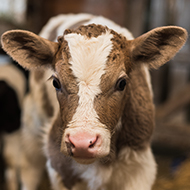
Surveillance urgently needed to determine spread
Bovine kobuvirus (BKV) has been discovered in cattle from the United States. The virus was first discovered in Japan in 2003, and has since been reported in a number of countries including Korea, Italy, Brazil and China. This new report was published in Emerging Infectious Diseases.
BKV belongs to a family of viruses known as picornaviridae, which includes rhinovirus – a source of head colds and sinus infections in humans. Little is known about the disease or its affects, as it is still fairly new to science.
Scientists from the University of Illinois’ Veterinary Diagnostic Laboratory sequenced the microbial DNA in faecal samples from cattle in the US, as well as analysing the intestines of two calves that had died after infection. The presence of BKV in these findings further supported previous studies’ that suggested that the virus is a causative agent for diarrhoea in calves.
According to the study, no other negative associations with bovine infection have been observed so far. However, surveillance of the virus in cattle or other species is minimal in North America, and scientists only have access to a limited number of complete genetic sequences via public databases. Therefore, much more needs to be done to understand this disease agent and its affects.
Veterinary clinical medicine professor at the University of Illinois Dr Leyi Wang said: “Continued surveillance is urgently needed to determine rates and distribution of BKV in North America.
“Whole-genome sequencing of both previously and newly discovered BKV isolates is needed to analyse genetic diversity and evolution.”



 The Veterinary Medicines Directorate (VMD) is inviting applications from veterinary students to attend a one-week extramural studies (EMS) placement in July 2026.
The Veterinary Medicines Directorate (VMD) is inviting applications from veterinary students to attend a one-week extramural studies (EMS) placement in July 2026.